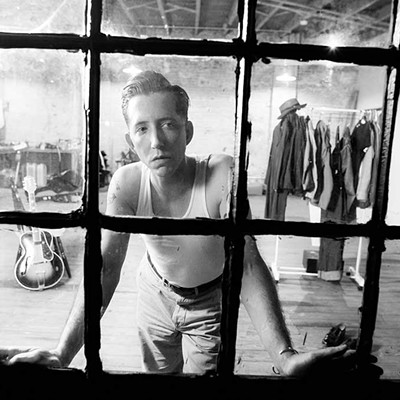It’s hard for St. Louis-based roots artist Pokey LaFarge to talk about his songwriting process. It’s not because he’s too shy or humble to extol his own virtues. He’s just not exactly sure how it happens.
“It’s kind of like having a series of brain orgasms,” LaFarge tells City Paper. “You feel sort of weightless or timeless. There’s a freeing feeling in singing something that feels good, but you’re not necessarily sure where it comes from.
“That’s why it’s hard for me to talk about songwriting specifically, because it’s so subconscious. And I think every songwriter experiences that, unless they’re just setting out to manufacture hits and I think you can really tell when that’s all they’re doing. But man, I just try to put myself in a state of mind where I’m open to a song at any moment.”
LaFarge has been writing songs and making music this way since 2006, turning out eight records, the latest being Manic Revelations, released in May. Beginning with 2006’s self-released record, Marmalade, LaFarge has taken listeners on a musical journey that is heavily influenced by early swing, big band, blues and Western swing. Western swing was certainly the most identifiable influence up until 2015’s Something in the Water.
LaFarge added percussion on that record, and his sound developed a sharper edge. On Manic Revelations, LaFarge continues to progress. Drums are more of a driving force on the new record; the songs even contain moments reminiscent of the early Sun Studio performances, although more like Carl Perkins than Elvis Presley. It’s a progression that LaFarge recognizes and embraces.
“That’s life, man. All of that music from the past is an extension of you,” LaFarge explains. “But you reinvent and reinterpret yourself almost on a daily basis, especially as an artist.
“I wanted more space in my music. I was feeling like that could be accomplished with more of a backbeat; more of a drums-and-bass foundation, as opposed to staying on top the beat and swinging all the time.”
There’s no better example of this than on the record’s first cut, “Riot in the Streets.” LaFarge wrote the song in the aftermath of the 2014 shooting of 18-year-old Michael Brown in the St. Louis suburb of Ferguson, Mo. Brown, an unarmed black man, was shot by a Ferguson police officer in broad daylight. LaFarge, who lives in St. Louis, says this song was born out of this incident and people’s reactions to it, both locally and nationally.
LaFarge writes in the song: “Preacher speaking; fists raised singing / Barely missing; tear gas whistlin’ / Walkin down West Florrisant road / feels like a city is going to explode / There’s gonna be a riot in the streets tonight.”
“The song was rewritten a few times,” LaFarge says. “I didn’t want to write a protest song. I’m not a protest singer. I also wanted to be careful not to inject too much anger into this. But there’s no reason you can’t write a beautiful song that compels people to fight. But I think it’s even more important to come together because that’s a type of fight as well.
“This song wasn’t necessarily about the riots themselves, because those were very few and far between. What happened after this shooting was mostly peaceful protest. It was about people’s backs being put up against a wall, and they have no choice but to fight.”
LaFarge is at his best when he’s writing about dealing with pain and adversity, especially when the songs like “Riot in the Streets” and the relationship song, “Must Be a Reason,” are placed on top of upbeat, hopeful music.
In the latter tune, LaFarge tries to figure out why people love who they love, even when those relationships are drenched in turmoil and drama. That theme was last examined in the title cut of Something in the Water. It’s about a guy in a relationship with someone that he can’t leave, regardless of the pain. “She’ll someday lead to my death I know / But I’ll stay with her just the same, boys”
In “Must Be a Reason,” LaFarge figures out that the passion is worth the pain. He writes, “I would fight for a life with you / The same thing that would kill me too / Love’s a war I cannot win / But I’ll see it through until the end.”
The song almost feels like a sequel to “Something in the Water,” but LaFarge says it didn’t start out that way. But he recognized the connection himself recently when he played the two songs back to back at a show.
“These songs are about the realization that you will never leave the relationship,” he says. “Not that you’re stuck with the person, but that you need that person for positive reasons and for the negative reasons. I’ve been with my girl for going on eight years now, and Lord knows we’ve experienced all of these things we’re talking about and more. I’m just thankful that I have music as an outlet to share the relationship with the world, because it’s material that’s relatable to a lot of people.”















